In the current modern business structure, effective communication is paramount. Companies are continually seeking ways to enhance their communication systems, reduce costs, and improve flexibility. Voice over Internet Protocol (VoIP) has emerged as a popular solution, promising to revolutionize business communications.
But is VoIP reliable for business? This question is important to consider. This blog explores the reliability of VoIP, how it works, and the advantages it offers to businesses.
For seamless VoIP integration with your existing business tools, choose a VoIP provider like CallHippo that offers robust API support and compatibility with your current software. Additionally, ensure your internet connection is high-quality and reliable to maximize the performance and benefits of your VoIP system.
Is VoIP Reliable for Business?
Voice over Internet Protocol (VoIP) has revolutionized the way businesses handle communication. By transmitting voice data over the internet rather than traditional phone lines, VoIP offers numerous benefits, including cost savings, flexibility, and advanced features. However, reliability is a crucial concern for any business considering VoIP. In the next section, we’ll explore the factors that affect the reliability of VoIP.
What Factors Affect The VoIP Reliability?
Below are the main components that affect VoIP reliability.
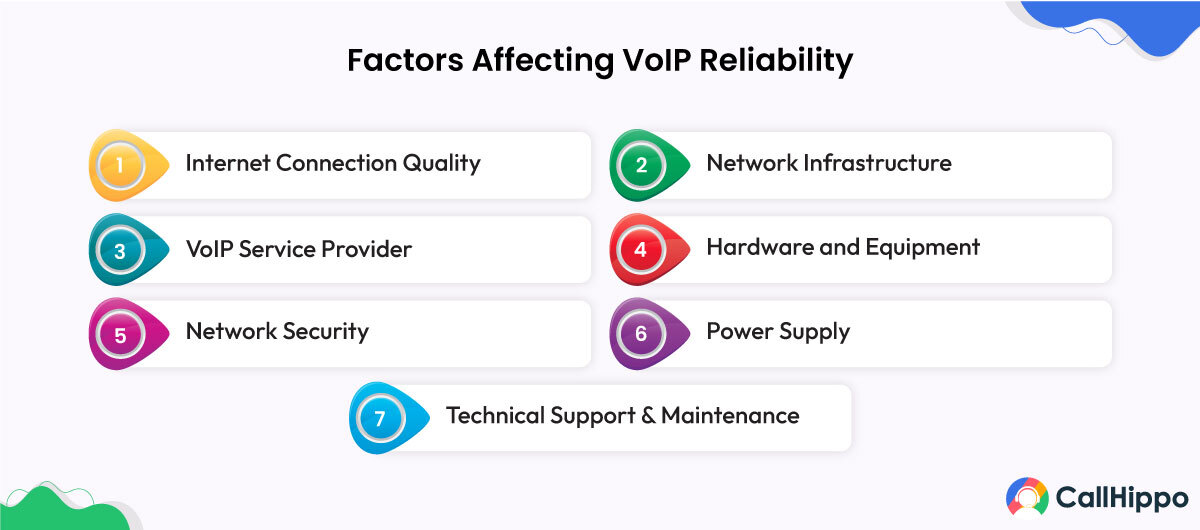
1. Internet Connection Quality
The foundation of VoIP reliability is a robust and high-speed internet connection. VoIP relies on the internet to transmit voice data, so any issues with the internet connection can directly impact call quality and reliability. Key aspects of internet connection quality include:
- Bandwidth – Adequate bandwidth is essential for handling multiple simultaneous VoIP calls.
- Latency – Latency refers to the delay in data transmission over the network.
- Jitter – Jitter is the variation in packet arrival times. High jitter can result in choppy audio and disrupted calls.
- Packet Loss – Packet loss occurs when data packets are lost during transmission.
2. Network Infrastructure
A reliable VoIP system requires a well-designed and maintained network infrastructure. Factors to consider include:
- Router and Switch Quality: High-quality routers and switches are crucial for managing VoIP traffic effectively. Business-grade equipment typically offers better performance and reliability compared to consumer-grade devices.
- Network Configuration: Proper network configuration, including Quality of Service (QoS) settings, helps prioritize VoIP traffic over other types of data, reducing the chances of congestion and ensuring better call quality.
- Wired vs. Wireless: Wired connections are generally more stable and reliable for VoIP compared to wireless connections, which can be prone to interference and signal fluctuations.
3. VoIP Service Provider
The choice of VoIP service provider plays a significant role in the reliability of your VoIP system. Research the provider’s reputation for reliability and customer satisfaction. Look for reviews and testimonials from other businesses. Moreover, ensure the provider offers robust SLAs that guarantee a certain level of uptime and service quality.
4. Hardware and Equipment
The reliability of your VoIP system is also influenced by the quality and maintenance of your hardware and equipment. Therefore, invest in high-quality VoIP phones and adapters that are compatible with your VoIP service. Regularly update the firmware to ensure optimal performance.
5. Network Security
Network security is critical for maintaining the reliability and integrity of your VoIP system. Security threats such as hacking, eavesdropping, and denial-of-service (DoS) attacks can disrupt VoIP services. Implementing robust security measures, including firewalls, encryption, and regular security updates, can help protect your VoIP system from these threats.
6. Power Supply
VoIP devices and network equipment require a stable power supply to function correctly. Power outages can disrupt VoIP services, so it’s important to have backup power solutions in place, such as uninterruptible power supplies (UPS) or generators, to ensure continuity during power interruptions.
7. Technical Support and Maintenance
Ongoing technical support and maintenance are essential for the reliability of your VoIP system. Regularly monitoring and maintaining your network infrastructure, updating software and firmware, and having access to prompt technical support can help quickly resolve any issues that arise and prevent potential disruptions.
How Does VoIP Work?
VoIP technology converts voice signals into digital data packets and transmits them over the internet. This process differs significantly from traditional phone systems, which use circuit-switched networks to carry voice signals over copper wires.
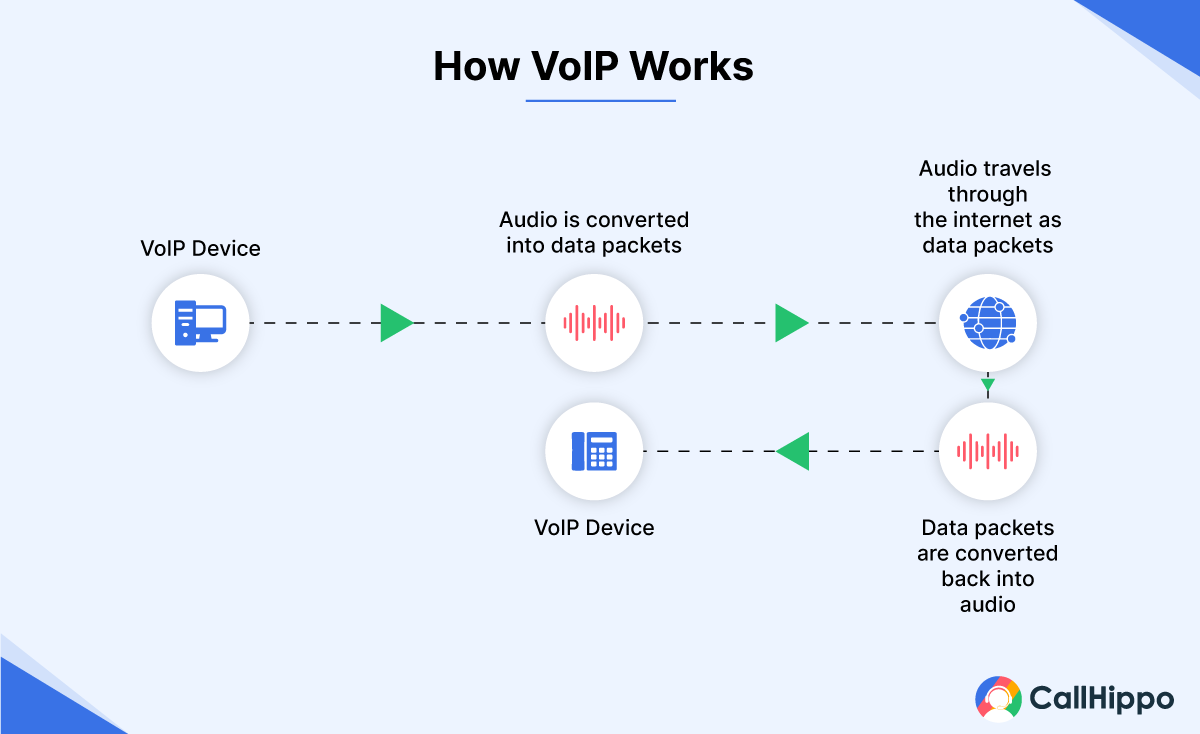
- Conversion of Voice Signals: When you speak into a VoIP-enabled device, your voice is converted into digital signals.
- Data Packet Creation: These digital signals are broken down into small data packets.
- Internet Transmission: The data packets are sent over the internet to the recipient’s device.
- Reassembly and Conversion: At the recipient’s end, the data packets are reassembled and converted back into voice signals.
VoIP services require a stable internet connection, compatible hardware (such as VoIP phones or adapters), and software (such as VoIP applications).
Advantages of VoIP for Businesses
VoIP offers several compelling advantages that make it an ideal choice for businesses:
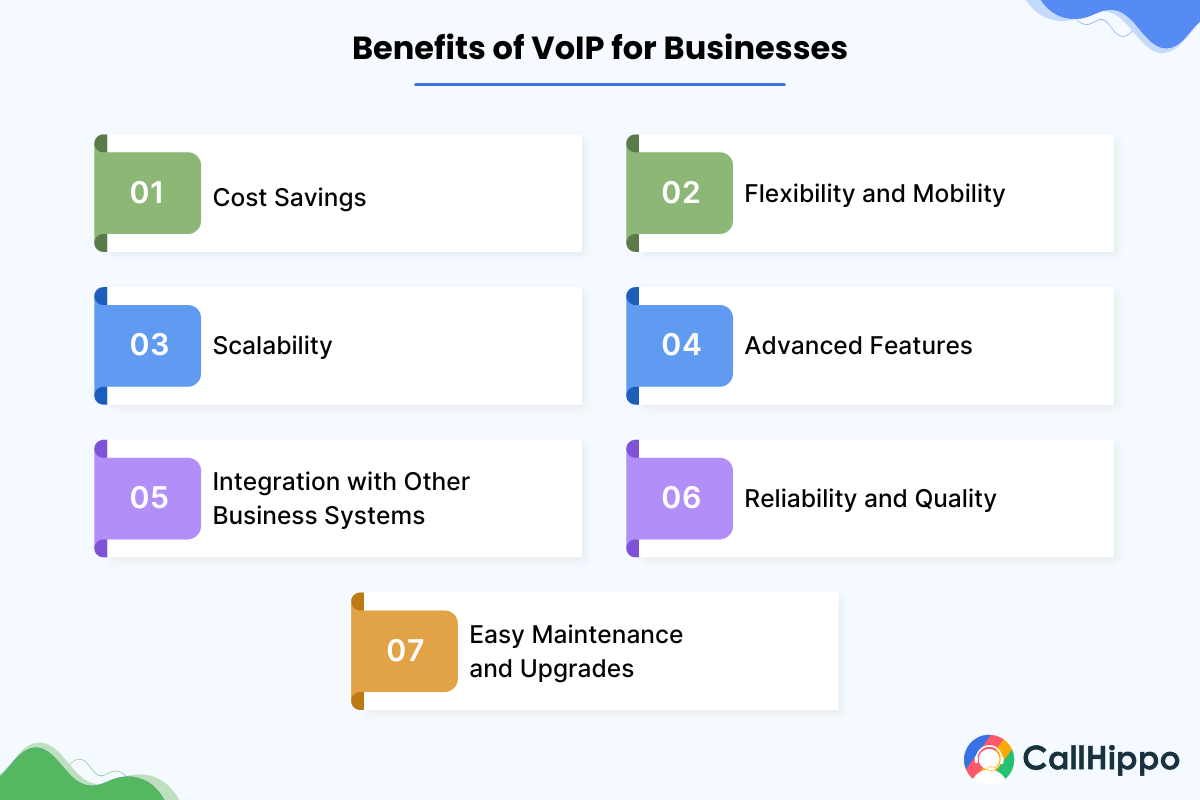
1. Cost Savings
One of the most significant benefits of VoIP is the potential for cost savings. Traditional phone lines, especially for long-distance and international calls, can be expensive. VoIP calls, however, are often cheaper because they use the Internet rather than traditional phone lines. Many VoIP providers offer affordable subscription plans that include unlimited calling within certain regions.
2. Flexibility and Mobility
VoIP systems provide greater flexibility compared to traditional phone systems. Employees can make and receive calls from anywhere with an internet connection, which is especially beneficial for remote and mobile workforces. VoIP services are accessible via various devices, including smartphones, tablets, and laptops, allowing employees to stay connected on the go.
3. Scalability
VoIP systems are highly scalable, making them suitable for businesses of all sizes. Adding or removing users is straightforward and can often be done without the need for additional hardware. This scalability ensures that businesses can adjust their communication systems in response to growth or changes in their workforce.
4. Advanced Features
VoIP offers a range of advanced features that enhance business communication. These features include:
- Call Forwarding
- Voicemail to Email
- Video Conferencing
- Auto-Attendant
5. Integration with Other Business Systems
VoIP systems can integrate with various business applications, such as Customer Relationship Management (CRM) software and email systems. This integration streamlines workflows and improves overall efficiency by allowing seamless communication and data sharing across platforms.
6. Reliability and Quality
Modern VoIP services offer high reliability and call quality, thanks to advancements in internet technology and VoIP infrastructure. Many providers use advanced codecs and Quality of Service (QoS) mechanisms to ensure clear and uninterrupted calls. Additionally, VoIP systems often include redundancy and failover options to maintain service continuity in case of internet outages or technical issues.
7. Easy Maintenance and Upgrades
Maintaining and upgrading VoIP systems is generally easier and less costly than traditional phone systems. Most updates and maintenance tasks can be performed remotely by the service provider, reducing the need for on-site technical support and minimizing downtime.
Future of VoIP in Business
By leveraging the internet for voice transmission, VoIP has provided businesses with a cost-effective, flexible, and feature-rich alternative to traditional phone systems. As technology continues to advance, the future of VoIP in business looks promising. Below are the main trends that will be prevalent in the near future –
1. Integration with Unified Communications
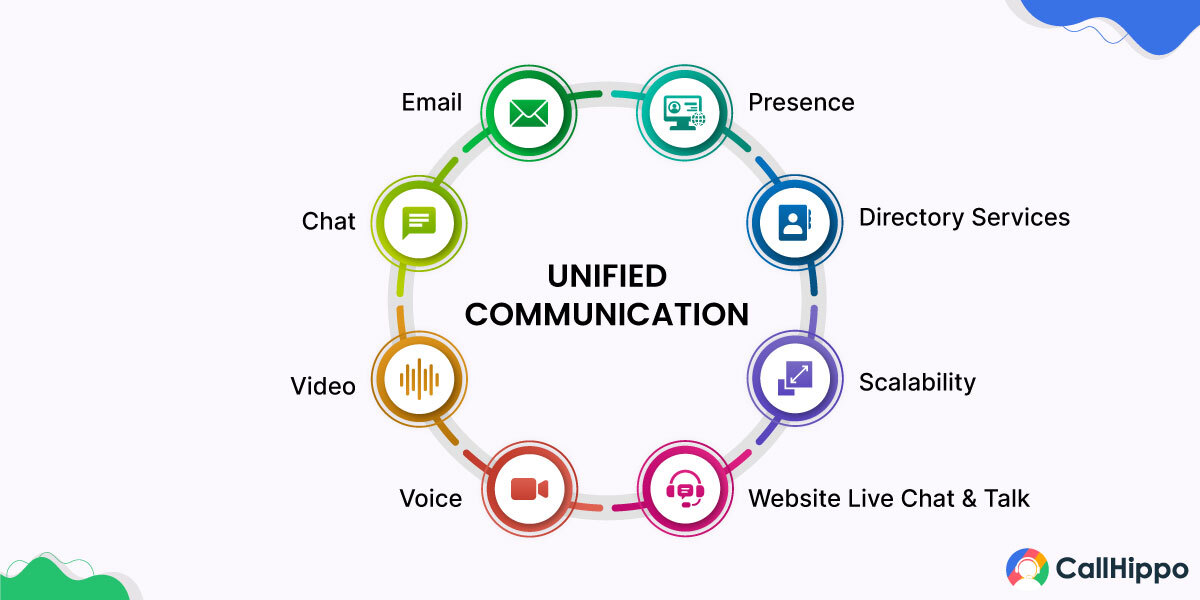
The trend towards Unified Communications (UC) is transforming how businesses manage communication and collaboration. VoIP is increasingly being integrated with UC platforms, which combine various communication tools such as voice, video, instant messaging, and email into a single interface. This integration enhances productivity by allowing seamless transitions between different communication methods.
2. Increased Adoption of Mobile VoIP
The rise of remote work and the growing use of mobile devices have spurred the adoption of mobile VoIP solutions. Mobile VoIP applications enable employees to make and receive calls using their smartphones, regardless of their location. This flexibility supports a mobile workforce and ensures that employees remain connected and productive on the go.
3. Enhanced Security Measures
As cyber threats evolve, so too must the security measures protecting VoIP systems. Future VoIP solutions will incorporate advanced security features such as end-to-end encryption, multi-factor authentication, and AI-driven threat detection. These enhancements will safeguard business communications against hacking, eavesdropping, and other security risks.
4. Integration with Artificial Intelligence (AI)
Artificial Intelligence (AI) is poised to play a significant role in the future of VoIP. AI-driven features such as voice recognition, natural language processing, and predictive analytics will enhance the functionality of VoIP systems. For example, VoIP AI can facilitate real-time language translation, automate customer service interactions, and provide insights into communication patterns.
5. 5G Technology and Improved Connectivity
The rollout of 5G technology promises to significantly enhance VoIP performance. With faster speeds, lower latency, and greater bandwidth, 5G will enable higher-quality voice and video calls, even in areas with previously unreliable internet connections. This improvement will further boost the adoption of VoIP in business settings.
Try CallHippo For Free
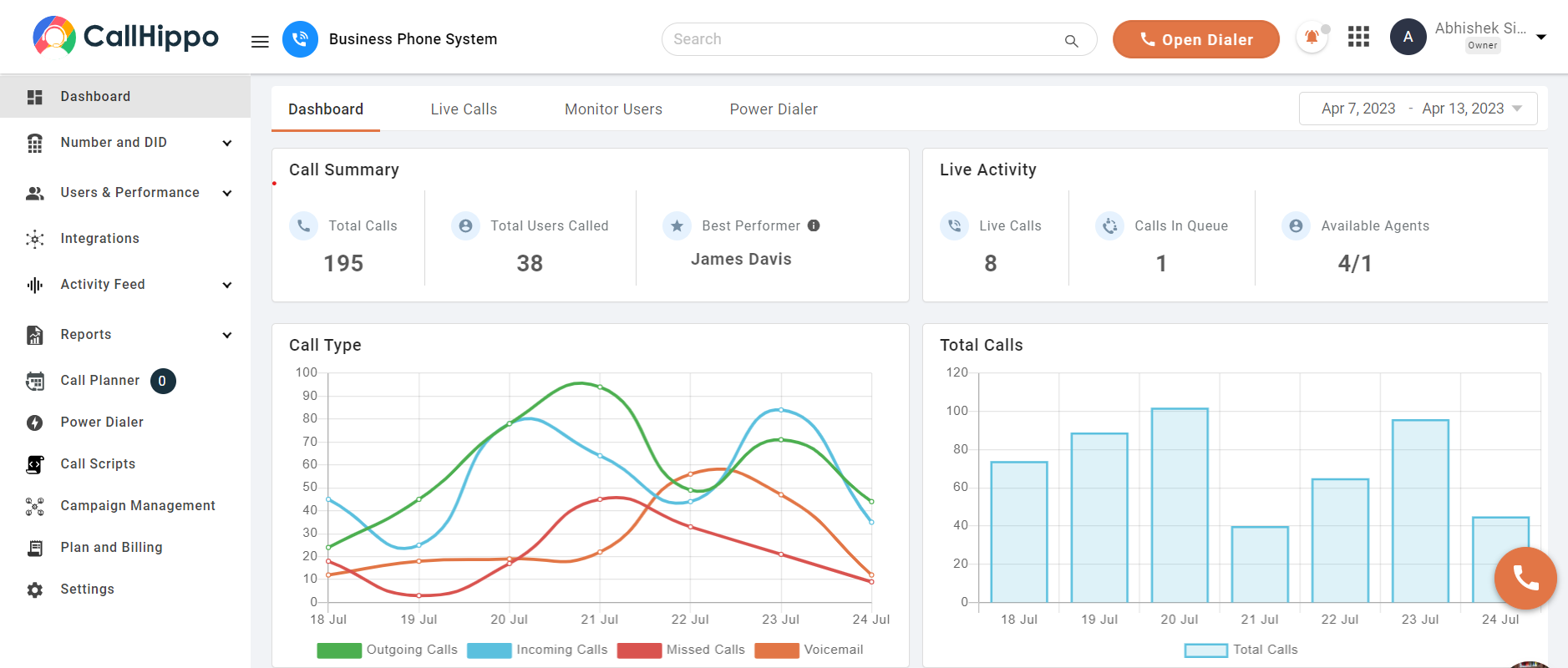
Voice over Internet Protocol (VoIP) has become a vital tool for businesses seeking cost-effective and flexible communication solutions. CallHippo is one of the leading VoIP service providers, offering a range of features designed to enhance business communication.
CallHippo is a cloud-based VoIP service provider that enables businesses to make and receive calls over the Internet. With its user-friendly interface, advanced features, and affordable pricing, CallHippo is a popular choice for businesses of all sizes. The platform supports international calling, making it an excellent option for companies with a global presence.
Steps for getting a CallHippo free trial –
- Visit the CallHippo Website.
- Sign/ Login with your account credentials.
- Enter your business details.
- Select your virtual number and configurations.
- Start making and receiving calls!
Final Thoughts
CallHippo offers a robust and feature-rich VoIP solution that can significantly enhance your business communication. With its free trial, you can experience the benefits of CallHippo without any financial commitment. Whether you are looking to reduce costs, support remote work, or improve customer service, CallHippo provides the tools and flexibility you need to succeed.
FAQs
1. Can VoIP integrate with other business tools?
Yes, VoIP can integrate with various business tools such as Customer Relationship Management (CRM) systems, helpdesk software, and productivity apps. These integrations streamline workflows, improve efficiency, and enhance overall communication by allowing seamless data sharing and process automation.
2. What is the cost of using VoIP?
The cost of using VoIP varies depending on the provider and the specific plan chosen. Typically, VoIP services are more affordable than traditional phone systems. Costs may include monthly subscription fees, charges for international calls, and any additional features or services. CallHippo offers VoIP services starting at $18.

Subscribe to our newsletter & never miss our latest news and promotions.









